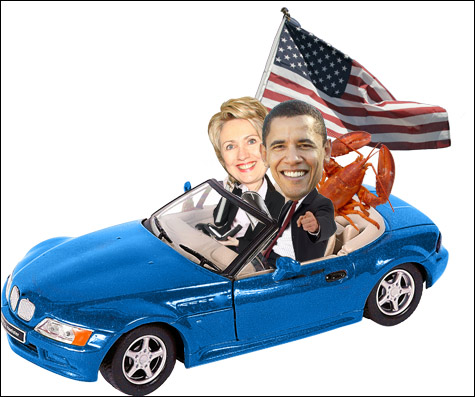 For all of you who promote "Official English" and who said this would never happen, here it is. A Judge has ruled "Learn English or Go To Jail!" The judge imposed this sentence on those here legally. As we move closer to a "Gestapo State," even with no standards set, the judge says, “There’s no way young kids can be hurt by knowing how to read and write the English language.”
For all of you who promote "Official English" and who said this would never happen, here it is. A Judge has ruled "Learn English or Go To Jail!" The judge imposed this sentence on those here legally. As we move closer to a "Gestapo State," even with no standards set, the judge says, “There’s no way young kids can be hurt by knowing how to read and write the English language.” By David Weiss dweiss@timesleader.com Court Reporter, WILKES-BARRE – March 27, 2008
That’s the succinct directive Luzerne County Judge Peter Paul Olszewski Jr. made as part of his sentence to four criminals on Tuesday. The defendants – Luis Reyes, Ricardo Dominguez, Kelvin Reyes-Rosario and Rafael Guzman-Mateo – all needed translators when they appeared in court to plead guilty to criminal conspiracy to commit robbery. It led to Olszewski leveling the unusual condition. He sentenced them each to four to 24 months in the county prison, but paroled three of them because they have already served at least four months. But in order for them to avoid the 24 months in prison, Olszewski ordered the men to learn to read and write the English language, earn their GED, and, within 30 days of release, get a full-time job while on parole. The defendants, who range in age from 17 to 22, are to return to court in one year with their parole officers to take an English test, according to Olszewski’s order. “If they don’t pass (the test), they’re going in for the 24 (months),” Olszewski said.
Attorneys Joseph Yeager and Ferris Webby, who represent the suspects, are looking at the ruling and laws before deciding whether to appeal. Neither has seen such an order in any past cases, they said. “First of all, let’s say it’s unusual,” Webby said. Webby said his role as an attorney requires him to look at the legality of the ruling, but, as a person, he knows Olszewski’s choice is good for his client, Guzman-Mateo. Guzman-Mateo realizes it, too.
“My client is happy,” Webby said. “I think it’s going to help him. It’s going to help him succeed.”
But that doesn’t make it right, said Agapito Lopez, a Latino community leader from Hazleton. He said he believes the ruling is a violation of the suspects’ rights. “I think that it’s contrary to the Constitution,” said Lopez, who stressed he is not an attorney and is speaking from a lay person’s perspective. “I don’t think that is due process. … I think this can be challenged in court.” Lopez said he will speak with attorneys from the American Civil Liberties Union to see if the decision should be challenged.
Police said the four were part of a group of people that approached two men, Reese Tankalavage and Cletus Mumie, on May 29 on Locust Street and asked them if they had any marijuana. When Tankalavage and Mumie said no, the four suspects told them to empty their pockets. That’s when one of the people in the group struck Mumie in the head with a rawhide bone. Another man pulled out a gun. The group then searched the duo’s pockets before telling them it was “their block and they better not see them around there anymore,” police said.
In sentencing the four defendants on Tuesday, Olszewski gave Reyes, Dominguez and Guzman-Mateo immediate parole. Reyes-Rosario is doing jail time on an unrelated drug charge. His sentence in the robbery case will begin after he completes the drug sentence. Olszewski said the language condition he imposed on the defendants, who are resident aliens, was not something he had planned. Once he saw all the translators in court for one case, the idea dawned on him.
The decision, he said, could help cut down on extreme costs associated with the paying for translators for each court appearance. Plus, he said, one of the defendants only went to third grade; the others didn’t finish high school. Learning English will help them get their GED first, and then a job, he said. “Do you think we are going to supply you with a translator all of your life?” he asked them.
Olszewski is ready to face any flak from the ruling. “I’d like anyone to tell me that learning the English language is not a good thing,” he said. “I’d love to hear from them.” Learning the language could help the suspects, Lopez said. But it would not assure them of getting a job – that theory is merely mythical, he said.
“This is a country in which English is not the official language,” he said. “We cannot force people to learn the language.” Olszewski said the parties can ask him to reconsider the ruling within 10 days. No one, he said, objected to the ruling in court Tuesday. Olszewski is unaware of whether this condition had been previously imposed. It’s not the first creative sentence Olszewski has imposed. He regularly orders defendants to get and maintain a full-time job, but also helps them find work. He has his tipstaff, Ron Zukosky, coordinate with an employment agency to find the defendants work. The judge also has ordered young defendants who dropped out of school to return and finish school. “There’s no way young kids can be hurt by knowing how to read and write the English language.” Judge Peter Paul Olszewski Jr.






















